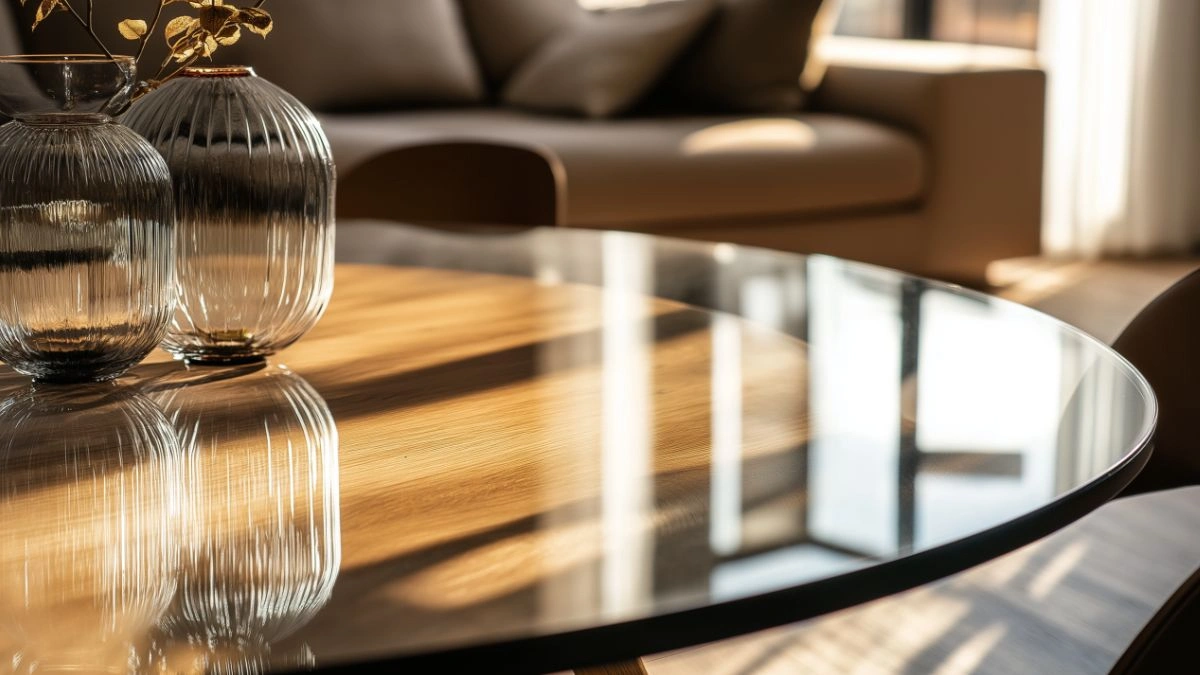Glass Dining Table Design Ideas to Brighten and Elevate Your Dining Area
Table of Contents
A well-lit dining area does more than just showcase your style—it shapes how you experience everyday moments. Whether you’re gathering for a meal, working from home, or hosting friends, the right table design can completely transform the atmosphere of your space. And when it comes to creating an airy, bright, and sophisticated dining area, nothing compares to the elegance of a glass dining table.
Glass tables reflect light, give the illusion of more space, and offer a minimalist charm that works beautifully across modern, transitional, and even rustic interiors. According to interior design trends, glass surfaces are making a strong comeback, especially in small or open-plan living spaces where light and flow are essential.
In this post, we’ll walk through inspiring and practical glass dining table design tips that will help you brighten your dining area without sacrificing style or comfort. From shape and base materials to styling suggestions, color palettes, and room layouts, you’ll find creative solutions to suit any aesthetic. Let’s explore how this timeless design element can elevate your entire living space.
Benefits of Using a Glass Dining Table in Your Living Area
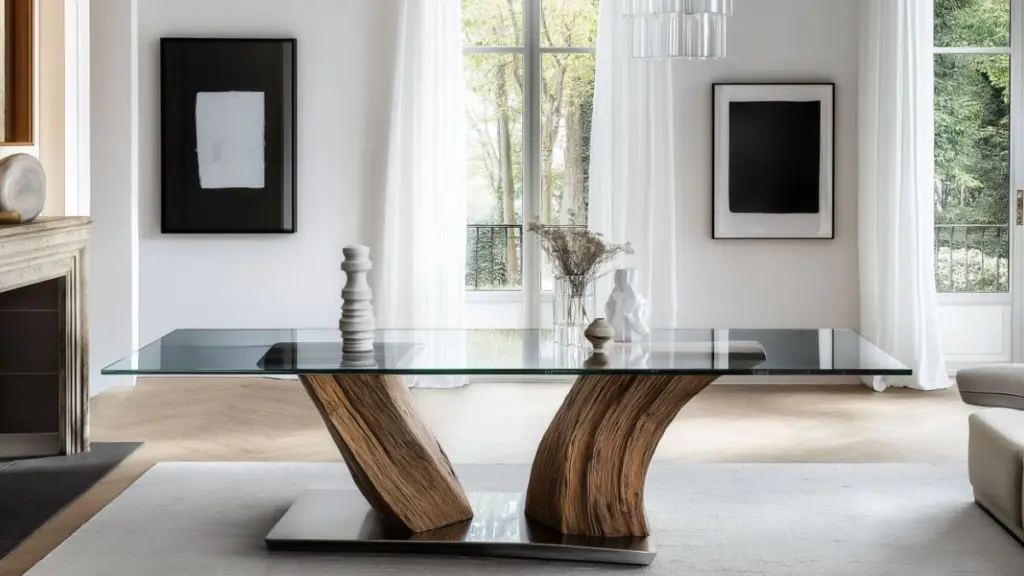
A glass dining table offers more than just good looks. It brings practical advantages that suit both small and large spaces. One of its most appealing qualities is its ability to reflect natural and artificial light, instantly brightening any room.
Glass tables visually “disappear” in the space, making them ideal for compact layouts where bulky furniture could overwhelm the area. They also complement a wide variety of materials—wood, metal, leather, rattan—allowing them to fit effortlessly into eclectic or transitional designs.
Glass is surprisingly durable, especially tempered varieties, and resists staining better than many wooden surfaces. While it requires regular cleaning to stay smudge-free, its sleek aesthetic rewards the effort.
Glass Dining Table Benefits Table
| Benefit | How It Improves Your Space |
|---|---|
| Light Reflection | Brightens the area and enhances natural light |
| Visual Space Expansion | Makes small rooms feel open and airy |
| Material Versatility | Pairs well with wood, metal, stone, or upholstered pieces |
| Design Flexibility | Fits modern, traditional, minimalist, and glam styles |
Choosing the Right Shape for Your Space
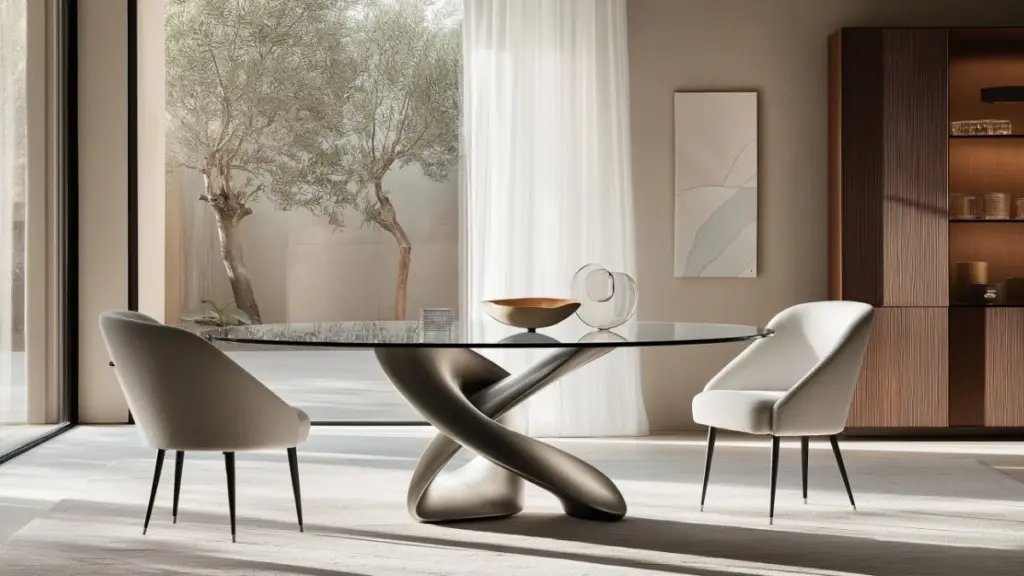
The shape of your dining table plays a major role in defining the room’s layout and energy. Glass dining tables come in a variety of shapes—round, rectangular, oval, and square—each with its own benefits depending on the size and flow of your space.
A round glass table works beautifully in smaller rooms or breakfast nooks, encouraging conversation and softening the angles of a square layout. Rectangular tables are ideal for long, open spaces and can seat more guests comfortably. Oval tables offer a balance between the two—streamlined yet intimate. Square tables, meanwhile, work best in compact spaces with a modern layout.
Each shape also pairs differently with seating options. Benches suit rectangular tables, while curved-back chairs are a natural fit for round and oval designs.
Table Shape Breakdown
| Shape | Best For | Space Impact |
|---|---|---|
| Round | Small dining areas, cozy nooks | Encourages conversation, fits tight corners |
| Rectangular | Large or open-concept spaces | Formal and functional, accommodates more seats |
| Oval | Transitional layouts | Softens the look of long rooms |
| Square | Modern or compact rooms | Adds symmetry and balanced form |
Explore Glass Table Base Materials for a Unique Look
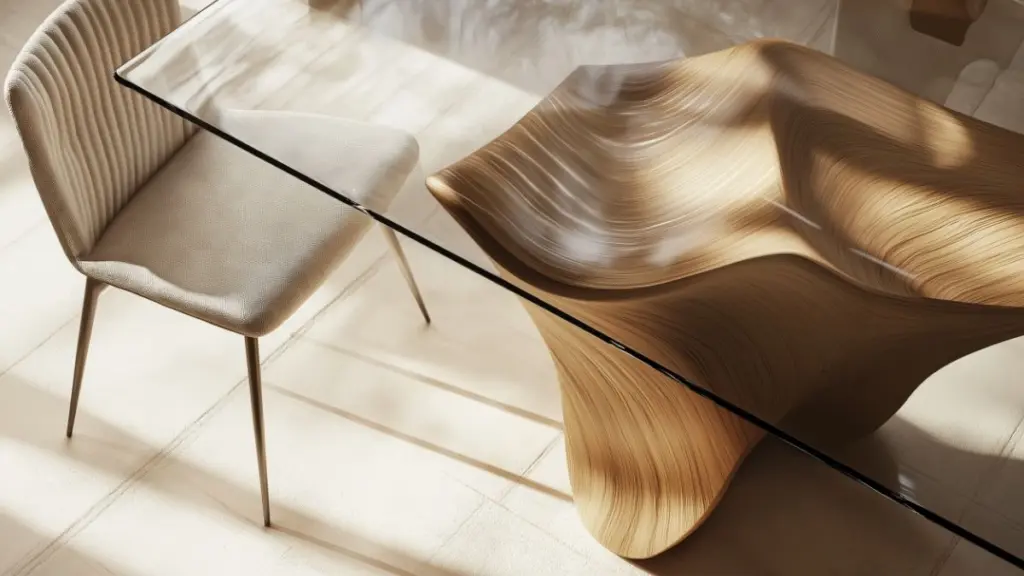
A key design element of any glass table is its base. Since the tabletop is transparent, the base often becomes the visual focal point. Fortunately, glass tables come with a wide range of base styles—from sculptural wood to modern metal to minimalist acrylic.
A wood base introduces warmth and organic texture, grounding the modern glass top in a natural aesthetic. Metal bases, especially in black or gold finishes, offer a sleek, contemporary vibe. For a dramatic effect, try geometric or pedestal bases that act as functional art.
You can also consider mix-and-match styles. A rustic reclaimed wood base topped with clear glass blends farmhouse charm with modern minimalism. A mid-century tulip base creates a timeless and chic look.
Table Base Material Guide
| Base Material | Style Effect | Best Paired With |
|---|---|---|
| Wood | Warm, organic, rustic or cozy | Linen chairs, jute rugs, greenery |
| Metal | Sleek, industrial or glam | Velvet seating, marble accents |
| Acrylic or Lucite | Ultra-modern and subtle | Monochrome rooms, high-gloss finishes |
| Sculptural Resin | Artistic and bold | Minimalist surroundings, neutral tones |
Style Your Glass Dining Table with Texture and Warmth
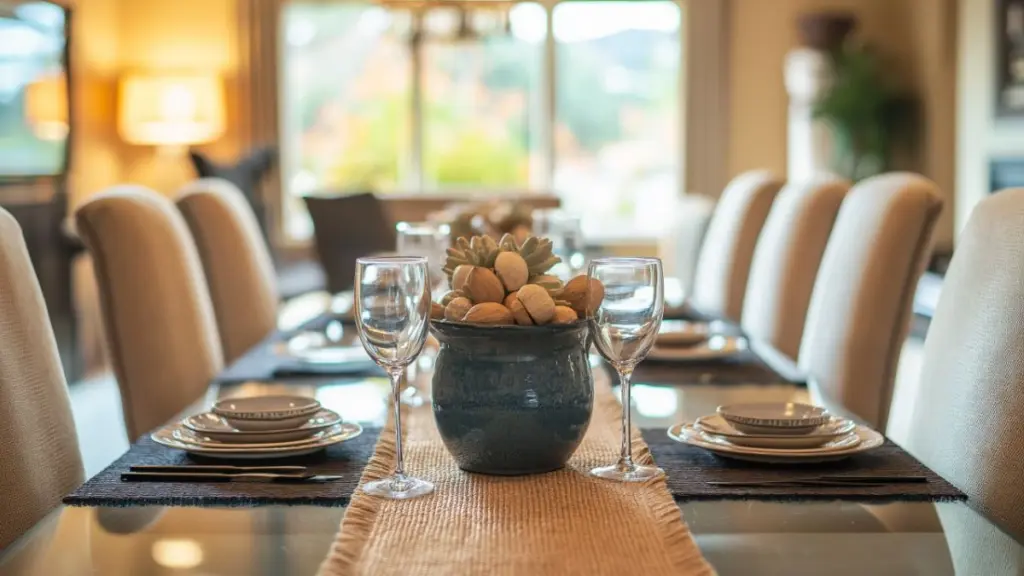
While a glass dining table offers a clean and airy aesthetic, it can sometimes feel stark or cold without the right accessories. The key to creating a cozy ambiance lies in adding layers of texture, soft tones, and curated decor elements.
Start with a soft runner or placemats—linen, cotton, or woven jute are ideal materials. These break up the sleek surface of the glass and provide a tactile layer that complements the rest of your living area. Neutral tones like oatmeal, soft gray, or muted olive work best in organic or modern settings.
Next, incorporate natural centerpieces. Think dried florals, a ceramic bowl filled with seasonal fruits, or a small arrangement of branches in a sculptural vase. These elements add both texture and personality. Avoid overly busy or tall arrangements that block visibility across the table.
When it comes to dining chairs, balance the coolness of glass with upholstered or wooden options. Chairs with curved backs, rattan weave, or leather seats provide warmth and comfort while enhancing the overall style.
Styling Suggestions Table
| Item Type | Example Materials | Purpose |
|---|---|---|
| Runner/Placemat | Linen, jute, cotton | Soften the look, protect surface |
| Centerpiece | Ceramic, dried botanicals | Add warmth and seasonality |
| Chairs | Rattan, upholstered fabric | Balance form with comfort |
| Layered Lighting | Pendant, candles | Create ambiance and define space |
Use Strategic Lighting to Highlight Your Glass Table
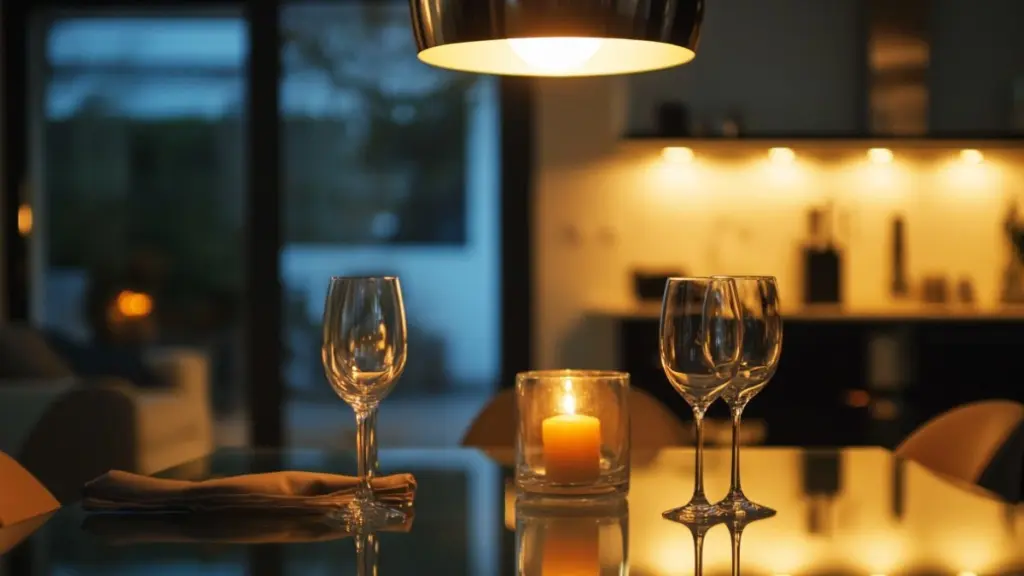
Lighting plays a pivotal role in how your glass dining table is perceived. Because glass reflects and transmits light, the right lighting setup can enhance its elegance and make your entire dining area feel brighter and more expansive.
Pendant lighting is the most popular choice for highlighting a dining table. A statement pendant fixture—especially with brass, woven, or matte black finishes—can provide visual structure and create a cozy halo of light. Make sure the fixture is centered and hung about 30–36 inches above the table for optimal illumination and balance.
For layered lighting, include sconces, floor lamps, or LED strip lighting around architectural features to support a soft, glowing effect. Use warm white bulbs (2700K–3000K) to avoid harsh or cold reflections on the glass surface.
Candles and lanterns also work beautifully in the evenings. Their flickering light reflected on the glass adds romance and visual interest.
Lighting Plan Overview
| Lighting Type | Position | Visual Effect |
|---|---|---|
| Pendant Light | Above center of table | Focal glow, defines dining zone |
| Wall Sconces | Adjacent walls or nearby nook | Ambient lighting, complements centerpiece glow |
| Floor Lamp | Corner of dining space | Softens shadows, expands brightness |
| Candlelight | Tabletop or sideboard | Adds romance and cozy reflections |
Combine Glass with Natural Elements for Balance
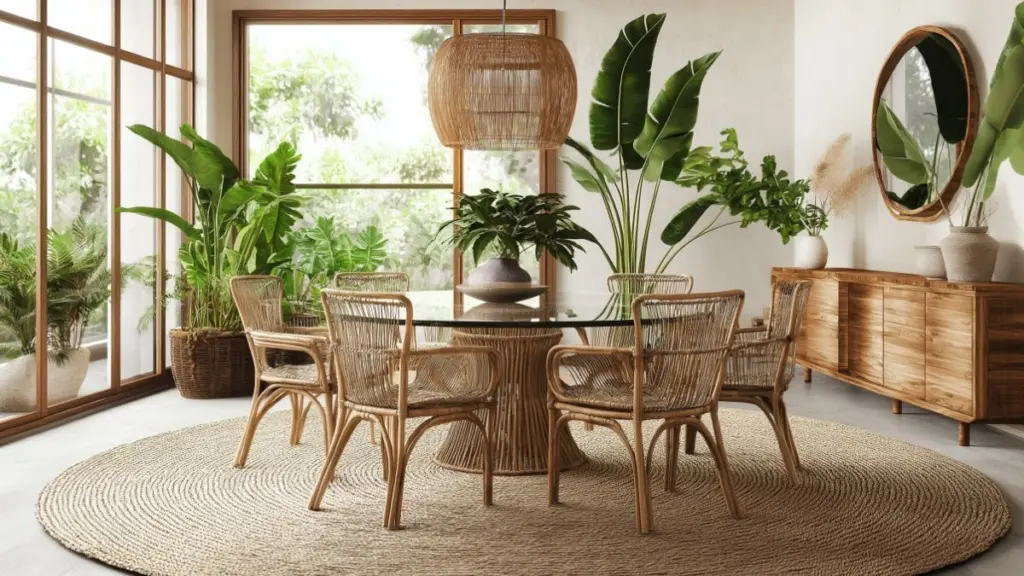
While glass gives off a sleek and modern feel, pairing it with organic elements ensures your dining area stays grounded and inviting. This design strategy is especially effective in open-plan living rooms, where flow and cohesion matter.
Bring in natural elements through furniture accents, decor, and finishes. A wood-framed mirror on the wall, a woven area rug under the table, or cane-back chairs instantly infuse warmth. Even small potted plants, olive trees, or fresh eucalyptus can freshen the atmosphere.
Combining materials is essential to mastering mixed-modern interiors. A glass table offers a neutral base that allows other textures—like reclaimed wood beams or plastered walls—to stand out without competition.
Natural Element Pairing Ideas
| Natural Element | Best Application | Balancing Effect |
|---|---|---|
| Woven Rugs | Under dining table | Softens acoustics, adds texture |
| Potted Greenery | Corners or tabletop | Connects to nature, brightens space |
| Wooden Accents | Mirror frame, chairs, sideboard | Grounds sleek glass with warmth |
| Stoneware or Clay | Dishes, candle holders | Adds weight and earthy tone |
Pairing the Right Chairs with Your Glass Table
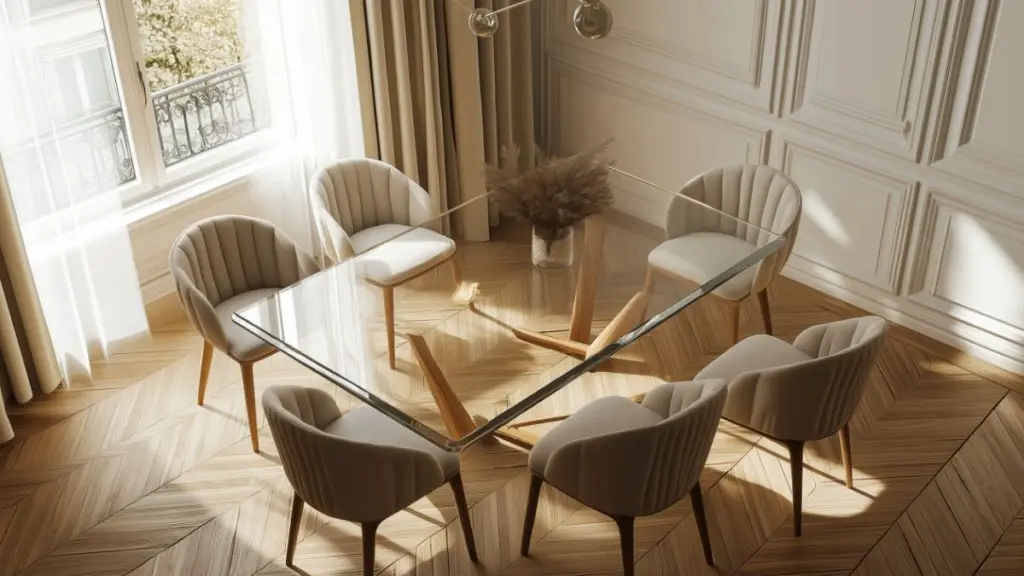
Choosing the right chairs is essential for both aesthetics and comfort. Since a glass table has a visually “light” profile, your chairs can either enhance that effect or introduce contrast to warm up the space.
For a minimalist look, opt for clear acrylic or metal-framed chairs. These maintain an open feel and let the table base shine. For more warmth and texture, go for upholstered seating in linen, boucle, or leather. Earthy tones like tan, soft gray, or cream pair beautifully with glass surfaces.
If your glass table has a sculptural or statement base, consider armless chairs to maintain visual flow. Want a cozier, rustic edge? Rattan or wood chairs in a curved shape add personality while staying comfortable for everyday use.
Mixing chair styles (like two end chairs in a different design) can also elevate the look and provide practical seating options.
Chair Pairing Guide
| Chair Material | Design Style | Best Table Pairing |
|---|---|---|
| Upholstered Linen | Soft, elegant, cozy | Round or rectangular glass with wood base |
| Rattan/Wood | Rustic, organic, timeless | Matches glass-top with natural theme |
| Metal Frame | Modern, industrial | Geometric or pedestal glass base |
| Acrylic | Ultra-modern, invisible look | Compact rooms, keeps visual clarity |
Conclusion
A glass dining table offers more than just sleek aesthetics—it’s a versatile, light-enhancing centerpiece that can brighten your dining area and bring elegance to everyday moments. Whether you’re styling a modern apartment or a transitional home, the transparency and sophistication of glass allow for endless creativity.
By choosing the right shape, pairing complementary chairs, layering textures, and using thoughtful lighting, you can create a dining space that feels cohesive, warm, and effortlessly chic. With the tips above, your glass dining table becomes more than furniture—it becomes a reflection of your style, a hub for connection, and a visual statement that transforms your entire living room.

